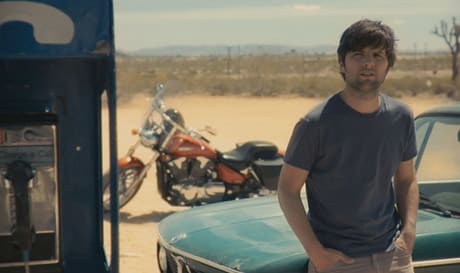Michael (Adam Scott), a late 30s writer ― situated somewhere between "aspiring" and "failed" on the continuum of modifiers ― is a loner, a wallflower, a quietly cantankerous future-phobe stalled in the era of cassette tapes and black and white television. Footloose younger brother Tobey (Joel Bissonnette, the writer/director's brother), a (possibly) recovered drug addict, is more a carpe diem, glass half full (of beer) kind of guy, given to admonishing Michael with "life wants to shake your hand and you're shaking your head" and other similar pearls of fridge-magnet wisdom.
Insofar as it's set entirely in L.A., and spends its peripatetic 85 minutes never getting much of anywhere except, ultimately, back to its starting point, Passenger Side reads as a slightly-skewed variant on our old friend the Canadian road movie.
We open with Tobey pressing a semi-reluctant Michael and his comically distressed green BMW into livery service for a series of ill-defined errands that we, and Michael, assume (incorrectly, as it transpires) to be drug-related. But while their route runs through a nice smattering of the stations of the cross of Lynch-ian L.A. quirk ― porn crew, over-eager tranny hooker, zoned-out desert sibyl, Joshua tree poacher with freshly severed fingers, and the like ― everything is played straight up and on the surface. But since Tobey is never seen to actually accomplish anything, all the eccentricity eventually comes to call attention to itself overmuch, to seem pro forma and self-justifying.
In fairness, the make-work whimsy may be somewhat beside the point, as it's psychic and not physical geography that Bissonnette is more intent on traversing. Passenger Side's chief pleasure and preoccupation is with the brothers' snipe-y, mom-likes-you-best badinage, which is unflaggingly smart, literate and deftly delivered.
Still, the epiphanic brother bonding that the form leads us to expect never quite materializes. Beyond a poignant late day confession of inadequacy from the ostensibly more successful Michael, and a glancing, CanCon-pleasing mention of their Canadian background, we never drill down deep enough to reach a place of identification or emotional investment. So, the movie idles at amiable and clever, without rolling on to moving or trenchant. Although, Bissonnette's wallop-packing coda ― explaining, finally, the mysterious messages that Michael leaves whenever a payphone comes to hand ― will startle all but the most irredeemably jaded romantic cynics.
Starting with the title, taken from the early Wilco track that plays under the closing credits, Passenger Side announces itself (and ultimately succeeds best) as a delivery system for a stupendously, distractingly well-curated indie rock soundtrack, by means of which significant extra cred will be conferred in the eyes and ears of the trucker-hat/Pavement T-shirt tribe, to the tune of at least one additional star.
(Kinosmith)Insofar as it's set entirely in L.A., and spends its peripatetic 85 minutes never getting much of anywhere except, ultimately, back to its starting point, Passenger Side reads as a slightly-skewed variant on our old friend the Canadian road movie.
We open with Tobey pressing a semi-reluctant Michael and his comically distressed green BMW into livery service for a series of ill-defined errands that we, and Michael, assume (incorrectly, as it transpires) to be drug-related. But while their route runs through a nice smattering of the stations of the cross of Lynch-ian L.A. quirk ― porn crew, over-eager tranny hooker, zoned-out desert sibyl, Joshua tree poacher with freshly severed fingers, and the like ― everything is played straight up and on the surface. But since Tobey is never seen to actually accomplish anything, all the eccentricity eventually comes to call attention to itself overmuch, to seem pro forma and self-justifying.
In fairness, the make-work whimsy may be somewhat beside the point, as it's psychic and not physical geography that Bissonnette is more intent on traversing. Passenger Side's chief pleasure and preoccupation is with the brothers' snipe-y, mom-likes-you-best badinage, which is unflaggingly smart, literate and deftly delivered.
Still, the epiphanic brother bonding that the form leads us to expect never quite materializes. Beyond a poignant late day confession of inadequacy from the ostensibly more successful Michael, and a glancing, CanCon-pleasing mention of their Canadian background, we never drill down deep enough to reach a place of identification or emotional investment. So, the movie idles at amiable and clever, without rolling on to moving or trenchant. Although, Bissonnette's wallop-packing coda ― explaining, finally, the mysterious messages that Michael leaves whenever a payphone comes to hand ― will startle all but the most irredeemably jaded romantic cynics.
Starting with the title, taken from the early Wilco track that plays under the closing credits, Passenger Side announces itself (and ultimately succeeds best) as a delivery system for a stupendously, distractingly well-curated indie rock soundtrack, by means of which significant extra cred will be conferred in the eyes and ears of the trucker-hat/Pavement T-shirt tribe, to the tune of at least one additional star.
